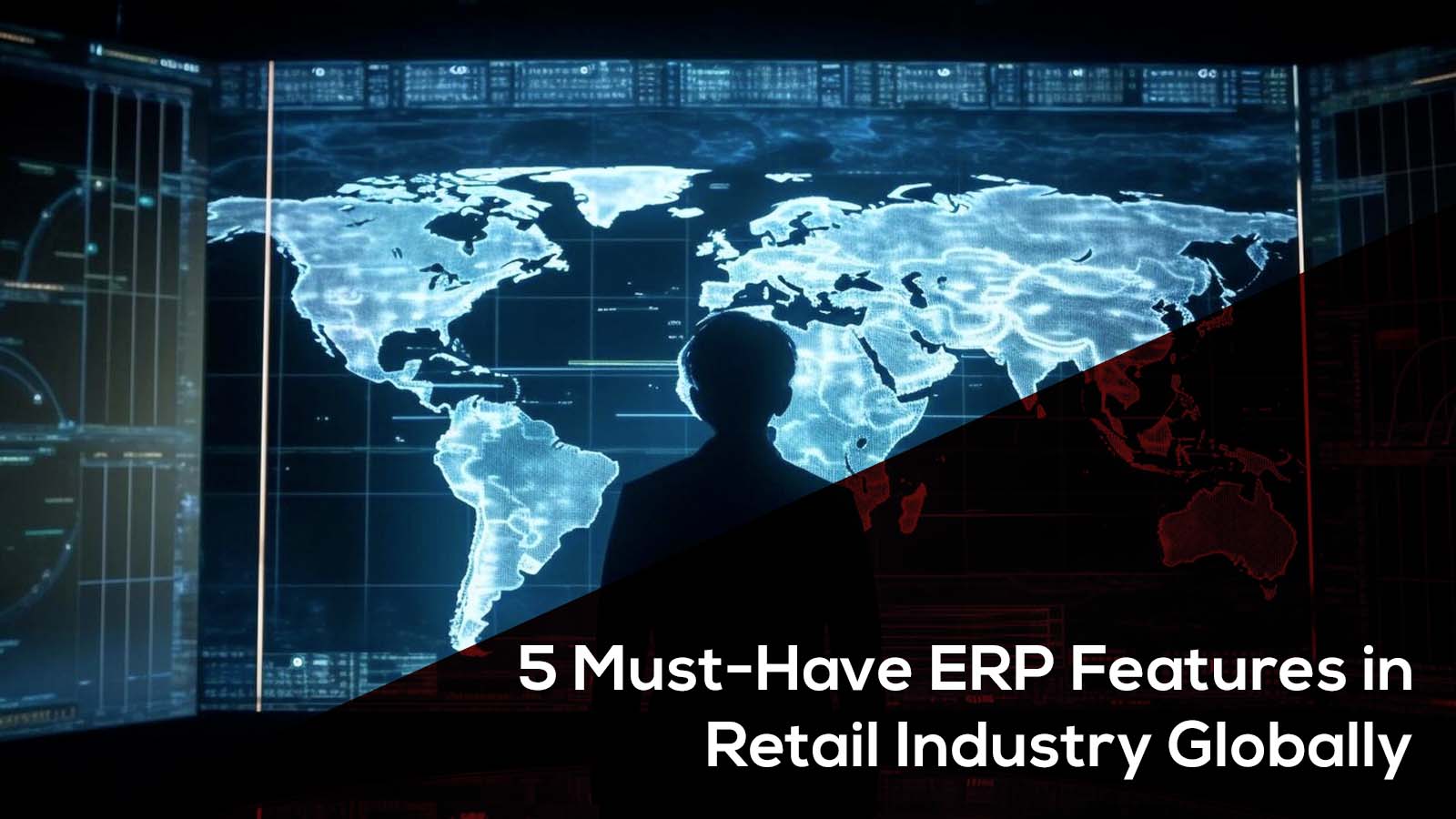Introduction
In an era dominated by technological advancements, the retail industry has witnessed a significant transformation, and Enterprise Resource Planning (ERP) systems have emerged as the backbone of this revolution.
For retailers aiming to stay competitive on a global scale, adopting ERP solutions with specific features has become vital. In this blog, we discuss the 5 must-have ERP features that are reshaping the retail landscape globally.
ERP Software for the Retail Industry
Enterprise Resource Planning (ERP) systems are comprehensive software solutions designed to integrate and manage core business processes. In the retail sector, ERP optimizes operations, fosters growth, and enhances customer satisfaction.
Seamless Inventory Management for Unmatched Efficiency
In the fast-paced world of retail, managing inventory efficiently is a necessity. According to recent statistics, retailers lose approximately $1.75 trillion annually due to poor inventory management. A robust ERP system equipped with advanced inventory management features can help retailers reduce these losses significantly.
Imagine having real-time insights into stock levels, sales trends, and order fulfillment. This is where ERP steps in, providing a centralized platform for seamless inventory tracking. With automated processes and accurate forecasting, retailers can minimize overstock or stockouts, ensuring product availability and customer satisfaction.
Integrated Customer Relationship Management (CRM) for Personalized Experiences
In an age where customer experience is key, having an ERP system with integrated CRM capabilities is a game-changer. According to a recent survey, 86% of consumers are willing to pay more for a better customer experience.
ERP systems with CRM functionality empower retailers to create personalized experiences for their customers. From tracking purchase history to analyzing preferences, these systems enable targeted marketing campaigns and enhance customer engagement. This not only fosters loyalty but also boosts sales, creating a win-win scenario for retailers.
Advanced Analytics Driving Informed Decision-Making
In the competitive retail landscape, data is everything. ERP systems equipped with advanced analytics tools provide retailers with actionable insights that can shape strategic decision-making. Studies show that businesses leveraging analytics are 2.2 times more likely to outperform others financially.
By analyzing sales patterns, customer behavior, and market trends, retailers can make informed decisions on pricing, promotions, and product assortment. This not only improves profitability but also positions retailers as market leaders with a deep understanding of consumer dynamics.
Mobile Accessibility for On-the-Go Management
The modern retail professional is constantly on the move, and accessibility is crucial. ERP systems with mobile capabilities enable people to stay connected and make critical decisions on the go. According to industry reports, 73% of retailers believe that mobile technology is essential for the future of retail.
From approving purchase orders to monitoring real-time sales data, mobile ERP access ensures that decision-makers are never out of touch. This level of flexibility not only enhances efficiency but also allows retailers to adapt quickly to changing market dynamics.
eCommerce Integration for Omnichannel Excellence
With the rise of online shopping, retailers must embrace a seamless omnichannel approach. ERP systems that integrate seamlessly with eCommerce platforms enable unified operations across online and offline channels. This integration enhances inventory visibility, order fulfillment, and customer experience.
Statistics indicate that 73% of customers use multiple channels during their shopping journey. Retailers without a robust ERP system integrating eCommerce may struggle to provide a consistent experience across the channels, potentially losing customers to competitors.
Challenges of ERP Software in the Retail Industry
Common challenges include resistance to change, data migration complexities, and the need for extensive training. To overcome these challenges, businesses can implement strategies such as comprehensive change management plans, phased implementation approaches, and investing in robust training programs.
Conclusion
The global retail industry is undergoing a significant shift, and the adoption of ERP systems with the right features is crucial for success. From streamlining inventory management to embracing eCommerce integration, the must-have features outlined in this blog post empower retailers to thrive in an ever-evolving market. By staying ahead of the competition and investing in these ERP features, retailers can position themselves as industry leaders, delivering unparalleled value to customers and stakeholders alike.
Frequently Asked Questions (FAQs)
What is ERP, and why is it crucial for the retail industry?
ERP, or Enterprise Resource Planning, is a software solution that integrates various business processes, providing a centralized platform for data management and decision-making. In the retail industry, ERP is crucial as it streamlines operations, enhances efficiency, and facilitates data-driven insights, ultimately optimizing the entire supply chain.
What challenges does the retail industry face that ERP can address?
The retail industry faces challenges such as inventory management, demand forecasting, and maintaining customer satisfaction. ERP addresses these by providing real-time data, automating processes, and improving collaboration among different departments, ensuring businesses can adapt to market demands effectively.
How can ERP assist in adapting to global market trends in the retail sector?
ERP systems provide the flexibility needed to adapt to rapidly changing global market trends. With features like real-time analytics, multi-currency support, and global supply chain management, retailers can respond swiftly to market shifts, ensuring they remain competitive on a global scale.
How does ERP contribute to compliance and risk management in the retail industry?
ERP systems assist retailers in adhering to regulatory requirements by providing robust data security, audit trails, and compliance reporting. This minimizes the risk of legal issues and ensures that the business operates within the boundaries of industry standards and regulations.
How can ERP support sustainability initiatives in the retail industry?
ERP systems contribute to sustainability by optimizing supply chain processes, reducing waste, and enhancing energy efficiency. By providing visibility into the entire product lifecycle, retailers can make eco-friendly choices and meet the growing demand for sustainable practices.
What should retailers consider when implementing ERP for their business?
Successful ERP implementation requires careful planning, employee training, and choosing a system that aligns with specific business needs. It’s essential to involve key stakeholders, define clear objectives, and work with experienced ERP providers to ensure a smooth and effective integration.








